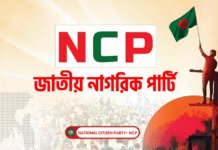Faruque Ahmed
Parliament passed the 16th amendment to the constitution last week empowering itself to remove the Judges of Supreme Court raising nationwide protest against the step which critics have denounced as a measure to gag the independence of the higher judiciary. Earlier the power to impeach Supreme Court Judges on charges of misconduct and incapacity to perform the job was vested in the Supreme Judicial Council. It was comprised of the Chief Justice and two other senior most Judges of the appellate division of the Bangladesh Supreme Court.
Meanwhile, critics have raised questions whether or not the Parliament will have similar right to impeach the functionaries of other quasi-judicial constitutional bodies like the Election Commission, Public Service Commission, Anti-Corruption Commission and Human Rights Commission.
Law Minister advocate Anisul Haque made the matter clear at a talk show in Independent Television last week agreeing to a question that henceforth Parliament will exercise all power and authorities of the Supreme Judicial Council and it will obviously include watch dog power over other constitutional bodies.
He said since all constitutional bodies were under the purview of the Supreme Judicial Council in matters relating to disciplinary measures, it is natural that Parliament will exercise power over them from now.
All constitutional bodies in danger
It appears that discussion on the 16th amendment to the constitution still remains largely confined to fears of gagging the independence of Judges of the higher court. But the TV talk show suggest that as the Parliament will watch the conduct and functioning of the other constitutional bodies, their independence may similarly come under severe threat. This is because Judiciary is meant to protect the basic rights of the people and interpret the constitutional laws which often find the government or the members of Parliament as accused in law suits. But if the Judiciary now feels shaken or functionaries in other constitutional bodies feel threatened, the foundation of the state may eventually fall apart.
Constitutional bodies are pillar of the state and if they have to function keeping in mind the wishes of the lawmakers or stand to lose jobs at their whims the rule of law is bound to suffer. But it appears that the government is taking advantage of its total control on the House and making laws for holding on to power indefinitely.
BNP chairperson Begum Khaleda Zia has blamed the government at a public meeting at Brahmanbaria last week saying, an unelected Parliament is now passing controversial laws one after another wrecking the foundation of the state.
Meanwhile, no sooner had the outcry over removal of Judges settled; the government has taken yet another move to gag the voice of the media. Apart from the introducing recent broadcasting policy to reign in the electronic media, news reports have revealed that the authorities are taking a new move to amend the Press Council Act, 1974 with some stringent rules for the media to follow.
The draft amendments include suspension of newspapers’ declarations and journalists’ accreditation cards for publishing ‘false, instigating, slanderous and anti-state’ reports. It also includes provision for suspension of government ads and duty free import of newsprint on similar charges.
The draft law also recommends punishment for reporters including fine of up to Tk 10 lakh for publishing reports that may ‘hurt the interests of the country, instigate chaos and destroy religious harmony’.
Attack on Press Council
Some other provisions also include obtaining mandatory certificate from Press Council to work as newsperson and facing eligibility screening to become a journalist. The move is taking shape after appointment of a new chairman of the Press Council and his meeting with Information Minister Hasanul Huq Inu was held in mid-August, informed sources say.
News analysis giving the background of the formation of Supreme Judicial Council said former President Ziaur Rahman at first introduced it by a military decree as Chief Martial Law Administrator. Later it was incorporated in the constitution and remained in force for more than 35 years. It was accepted as a neutral mechanism to watch the conduct of the Judges and save them from political intervention of the party in power.
In fact, President Zia had issued the decree to take away the power of the president to remove the Judges of Supreme Court which Sheikh Mijibur Rahman had earlier taken in his own hands shelving the 1972 constitution while launching his one party BAKSAL rule in the country in 1974.
The15th amendment to the constitution passed by the Sheikh Hasina government in 2011 had also retained the Supreme Judicial Council as a good work while dismissing some other Constitutional provisions which were initially decreed by martial law and later adopted as the basic laws.
The government now claims that by removing the Supreme Judicial Council, Parliament has returned to 1972 constitution in which the power to remove Supreme Court Judges was its privilege.
But the question is that when the country is not having a freely elected Parliament and majority of its members were elected without a contestant from the opposition, there is nothing like Parliamentary democracy in our system any more. This can hardly justify handing over power to impeach the Supreme Court Judges to such a Parliament.
Source: Weekly Holiday









